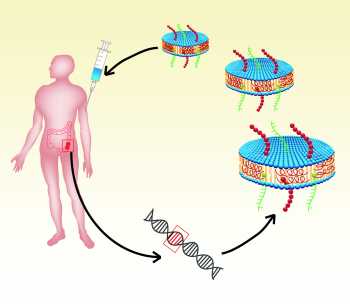27 Dec Vaccine Nanodiscs Can Trigger More Cancer Fighting Immune Cells
MedicalResearch.com Interview with:
James Moon, PhD
John Gideon Searle Assistant Professor
University of Michigan
Dept. of Pharmaceutical Sciences and Biomedical Engineering
Biointerfaces Institute
Ann Arbor, MI, 48109
MedicalResearch.com: What is the background for this study?
Response: The field of cancer immunotherapy has recently made a breakthrough with the clinical success of immune checkpoint inhibitors, which work by removing the brakes on immunosuppressed T-cells. However, these approaches generally work by augmenting pre-existing T-cell immunity and benefit only a subset of patients. In addition, because the majority of somatic mutations in cancer cells are unique to each patient, cancer immunotherapy may benefit from a personalized approach.
MedicalResearch.com: What are the main findings?
Response: We have developed a new cancer vaccine technology that tackles these challenges. We have produced homogeneous, stable, and ultrasmall nanodiscs that can efficiently deliver tumor antigen peptides and adjuvants to lymphoid tissues. Our nano-vaccines elicit robust anti-tumor immunity against new tumor epitopes, including neo-antigens specific to unique tumor mutations in a personalized manner. Our strategy in combination with immune checkpoint inhibitors generates striking levels of anti-tumor immunity that eradicates established tumors and protects animals against tumor recurrence.
MedicalResearch.com: What should readers take away from your report?
Response: Our vaccine nanodiscs, which have an established clinical manufacturing procedure and excellent safety profiles in humans, can generate significantly enhanced T-cell responses, compared with conventional vaccines.
MedicalResearch.com: What recommendations do you have for future research as a result of this study?
Response: Coupled with the recent innovations in tumor DNA/RNA sequencing, our nanodisc strategy may usher a new era of personalized cancer immunotherapy with patient-specific tumor antigens. We are working to translate our results to the clinic.
MedicalResearch.com: Is there anything else you would like to add?
Response: We have formed a new startup company EVOQ Therapeutics (www.evoqtherapeutics.com) to translate our results to the clinic.
MedicalResearch.com: Thank you for your contribution to the MedicalResearch.com community.
Citation:
Rui Kuai, Lukasz J. Ochyl, Keith S. Bahjat, Anna Schwendeman, James J. Moon. Designer vaccine nanodiscs for personalized cancer immunotherapy. Nature Materials, 2016; DOI: 10.1038/nmat4822
Note: Content is Not intended as medical advice. Please consult your health care provider regarding your specific medical condition and questions.
More Medical Research Interviews on MedicalResearch.com
Last Updated on December 27, 2016 by Marie Benz MD FAAD


